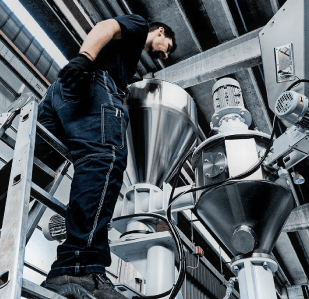Brief summary
Plastic pelletization is an industrial process usually carried out with a specialist granulation machine. Plastic that has not yet been modified (or recycled) is frequently transformed into granules. This process makes management and transport much easier. Let’s take a look at how it works in more detail.
Plastic pelletization: what is it and how does it work?
The principal at the basis of plastic pelletization is the process through which dissolving and mixing polymers in the molten state and additives turns plastic material into small, dry granules. An industrial machine designed especially for plastic compounding is used to produce these pellets. These devices feature heating elements, extruders, and dies to shape the molten plastic into granules. Choosing the right machinery depends on the type of plastic and the specifics of the pelletization process.
The process involves different stages, each of which plays a crucial role in transforming the plastic.
Let’s take a closer look at them:
-
Preparing the virgin material: in this phase, the virgin material is collected, selected, and prepared for the pelletization process. This may include removing impurities or adding preliminary additives.
-
Pelletizing the material: during this phase, the prepared virgin material undergoes the pelletization process, in which it is turned into small granules or pellets. This transformation can take place through pressure, heating, or other methods depending on the type of material and the required goals.
-
Cooling and storing the pellets: after pelletization, the new pellets pass through a cooling phase to consolidate their shape. They can then be stored appropriately to be used or transported as needed.
Benefits and challenges of plastic pelletization
Let’s focus on the positive aspects and potential challenges of this industrial process aimed at sustainability
Pros:
-
Easy management: the plastic pellets are easier to transport and store compared to the material in its raw state.
-
Reduction in volume: pelletization significantly reduces the volume of plastic waste, making the disposal process easier.
-
Better quality control: the plastic pellets can be produced in accordance with controlled specifics, guaranteeing greater quality consistency.
Although plastic pelletization offers indisputable benefits when it comes to reducing volume and managing waste, it is important to note the extent to which this process is not without challenges.
One of the most important aspects to be considered is this sense is the energy consumption linked to the pelletization phase. We should, however, point out that many companies in the sector are investing in increasingly energy efficient technologies, succeeding in minimizing the overall environmental impact during production.
Although the installation of this equipment may also bring with it significant initial investment, many businesses can soon write this off thanks to improved production efficiency, and the positive impact of this choice on the company’s reputation.
Towards sustainable use
As we have seen, plastic pelletization is a key process with constantly evolving technology that improves plastic management and processing.
If you’re interested in exploring the options available to your company further, contact us for a tailor-made consultation. Choosing the right machinery depends on the type of plastic and the specifics of the pelletization process. Bausano is a leader in the plastic pelletization solutions sector and can help you find the ideal cutting-edge solution for your specific needs.






